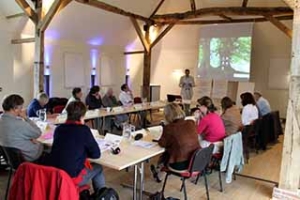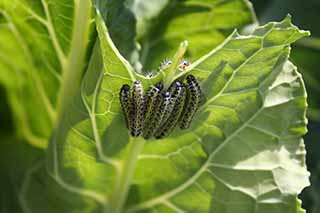
Code : HeCo-Eco
Contract Period : 01/03/2012 - 30/09/2013
Main Funder : Ekhaga Foundation, Sweden
ORC Staff Contact : Anja Vieweger

The project aims to critically review current health concepts in agriculture, to develop new, comprehensive and consistent health concepts for ecological agriculture.
In the past, aspects of health in agricultural contexts have mainly been discussed in separate discourses within soil science, plant science, animal science, and human medicine; with little interaction or communication among these disciplines. The questions “What is health?” and “How can health be measured?” have therefore not been discussed in a holistic and integrated way. A key statement of ecological agriculture and a founding stone for the principles of the organic agriculture movement however, is the connectedness of soil, plant, animal, man and planet through health. If health – in humans, animals, soil or plants – is such an important goal in agriculture, it needs to be clear what is meant by it and how it can be assessed. The aim of this project was therefore a clarification and critical assessment of health concepts in organic farming contexts, reviewing and comparing current approaches to define and measure health in the different domains, and bringing together the presently disconnected debates.
One essential step when linking the various domains of health in agriculture is to assess which criteria and indicators these domains use to describe health. This study looked at the five agricultural domains of humans, animals, plants, soils and ecosystems and investigated which criteria are used to describe health in these domains, performing a quantitative text analysis on health criteria in (a) the current scientific literature and (b) expert statements from interviews conducted in this project. Nearly 50 descriptors of health (e.g. balance, immunity, regeneration) were rated with regards to how suitable the authors of the texts have implied to see them as criteria of health. Additionally, in two interdisciplinary workshops, health concepts in agriculture and the IFOAM principle of health were discussed.
Project leader.
In the first workshop the cross-disciplinary use of the notion of resilience emerged as a universal, meaningful and measurable criterion of health; which can be applied to a wide range of subjects – soils, plants, animals, humans and ecosystems – with conceptual consistency. To our knowledge, this was the first time that the universality of resilience as a criterion of health was recognised.
This was independently confirmed by the content analysis, which indicated that among terms used most frequently to describe health in all five domains are the descriptors resilience, function, maintenance and resistance. Other terms are frequently used in one domain (productivity and sustainability in soil health), but much less frequently or not at all in the other domains. Still others were found to be used very infrequently as criteria of health (such as normality, coping, wholeness). Overall 42 different terms were used as criteria of health in the studied texts, reflecting a high diversity of conceptual approaches to health in the literature. In each domain, texts used at least 24 different criteria to describe health in their area; with the exception of animal health, where we found only 12 different terms.
The trends identified in this analysis show that there are similarities of concepts and shared criteria to describe health in the different domains; and that one of the most promising might be the concept of resilience, as it is among the most frequently used criteria in all domains.
Seeing that many concepts are not equally shared among the domains, it becomes clear that the specific ‘languages spoken’ and terms and concepts used in the different domains can lead to obstacles and difficulties when the organic principle of health is applied in a general way. This illustrates the importance of a clear communication of the meaning of health in the different domains for research, the formulation of principles and rules and their translation into practice.
The second workshop identified important next steps towards a better understanding, application and communication of the principle of health in the areas of practice, policy and research; including (a) the set-up of a best practice network for the clear identification and demonstration of health concepts in organic agriculture; (b) the continued dialog among disciplines and stakeholders; (c) a gap analysis for regulations and standards of organic agriculture; and (d) the establishment of a reference system (e.g. long-term trials) for research purposes.
Many studies describe health links covering parts of agricultural systems, e.g. the “One-Health” approach, addressing links between human and animal health, or the well-studied interactions between soil health and plant health. By contrast, the system as a whole, considering health-links among all domains is not well described.
Therefore an intensified and continued interdisciplinary dialogue of relevant disciplines, including soil science, plant pathology, veterinary science and human medicine, is necessary for a more integrated and more comprehensive understanding of health in agriculture. Such a dialogue will reveal promising avenues to explore the fascinating ways in which the ‘healths’ of soils, plants, animals, humans and ecosystems are connected.
By starting this dialogue we have uncovered resilience as a universal criterion of health, which is shared by all domains. This concept of resilience can provide a focus area for further research and implementation of the principle of health in agricultural practice. It is, despite some variations in the understanding of resilience in different disciplines, a dynamic and relevant criterion of health across all levels and areas of agriculture, and can be used as a link between the domains of soil, plant, animal, human, and ecosystem health.
Dr Thomas Döring, now at Humboldt University, Berlin
Prof Maria Finkh, University of Kassel, Germany
Dr Mette Vaarst, Aarhus University, Denmark
Dr Marco Pautasso, Research center for Functional Ecology and Evolution (CEFE), France
For this project a first year Interim Report and a final Report was produced.